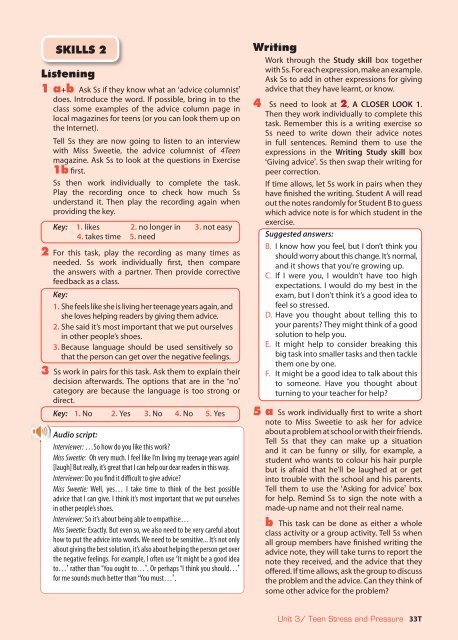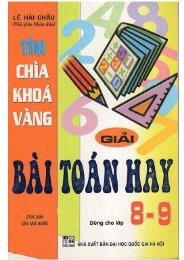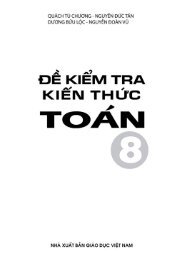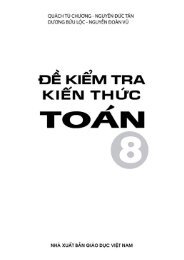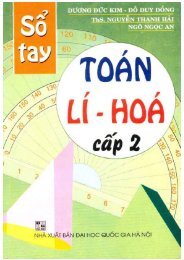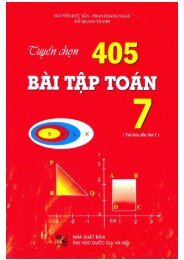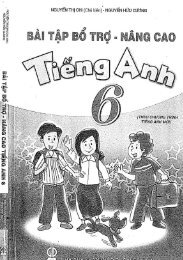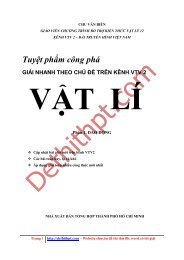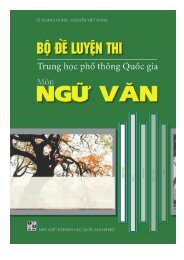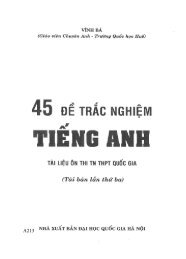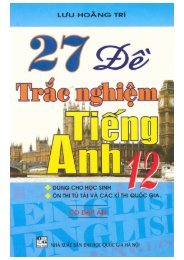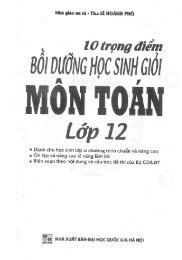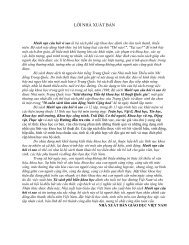Sách giáo viên Tiếng Anh 9 Thí điểm 2 tập (Pilot English 9 for Teacher)
https://app.box.com/s/rnv2yu1duebjhdpkknu2l47p9nmel5ax
https://app.box.com/s/rnv2yu1duebjhdpkknu2l47p9nmel5ax
You also want an ePaper? Increase the reach of your titles
YUMPU automatically turns print PDFs into web optimized ePapers that Google loves.
SKILLS 2<br />
Listening<br />
1 a+b Ask Ss if they know what an ‘advice columnist’<br />
does. Introduce the word. If possible, bring in to the<br />
class some examples of the advice column page in<br />
local magazines <strong>for</strong> teens (or you can look them up on<br />
the Internet).<br />
Tell Ss they are now going to listen to an interview<br />
with Miss Sweetie, the advice columnist of 4Teen<br />
magazine. Ask Ss to look at the questions in Exercise<br />
1b first.<br />
Ss then work individually to complete the task.<br />
Play the recording once to check how much Ss<br />
understand it. Then play the recording again when<br />
providing the key.<br />
Key: 1. likes 2. no longer in 3. not easy<br />
4. takes time 5. need<br />
2 For this task, play the recording as many times as<br />
needed. Ss work individually first, then compare<br />
the answers with a partner. Then provide corrective<br />
feedback as a class.<br />
Key:<br />
1. She feels like she is living her teenage years again, and<br />
she loves helping readers by giving them advice.<br />
2. She said it’s most important that we put ourselves<br />
in other people’s shoes.<br />
3. Because language should be used sensitively so<br />
that the person can get over the negative feelings.<br />
3 Ss work in pairs <strong>for</strong> this task. Ask them to explain their<br />
decision afterwards. The options that are in the ‘no’<br />
category are because the language is too strong or<br />
direct.<br />
Key: 1. No 2. Yes 3. No 4. No 5. Yes<br />
Audio script:<br />
Interviewer: …So how do you like this work?<br />
Miss Sweetie: Oh very much. I feel like I’m living my teenage years again!<br />
[laugh] But really, it’s great that I can help our dear readers in this way.<br />
Interviewer: Do you find it difficult to give advice?<br />
Miss Sweetie: Well, yes… I take time to think of the best possible<br />
advice that I can give. I think it’s most important that we put ourselves<br />
in other people’s shoes.<br />
Interviewer: So it’s about being able to empathise…<br />
Miss Sweetie: Exactly. But even so, we also need to be very careful about<br />
how to put the advice into words. We need to be sensitive... It’s not only<br />
about giving the best solution, it’s also about helping the person get over<br />
the negative feelings. For example, I often use ‘It might be a good idea<br />
to…’ rather than ‘You ought to…’. Or perhaps ‘I think you should…’<br />
<strong>for</strong> me sounds much better than ‘You must…’.<br />
Writing<br />
Work through the Study skill box together<br />
with Ss. For each expression, make an example.<br />
Ask Ss to add in other expressions <strong>for</strong> giving<br />
advice that they have learnt, or know.<br />
4 Ss need to look at 2, A CLOSER LOOK 1.<br />
Then they work individually to complete this<br />
task. Remember this is a writing exercise so<br />
Ss need to write down their advice notes<br />
in full sentences. Remind them to use the<br />
expressions in the Writing Study skill box<br />
‘Giving advice’. Ss then swap their writing <strong>for</strong><br />
peer correction.<br />
If time allows, let Ss work in pairs when they<br />
have finished the writing. Student A will read<br />
out the notes randomly <strong>for</strong> Student B to guess<br />
which advice note is <strong>for</strong> which student in the<br />
exercise.<br />
Suggested answers:<br />
B. I know how you feel, but I don’t think you<br />
should worry about this change. It’s normal,<br />
and it shows that you’re growing up.<br />
C. If I were you, I wouldn’t have too high<br />
expectations. I would do my best in the<br />
exam, but I don’t think it’s a good idea to<br />
feel so stressed.<br />
D. Have you thought about telling this to<br />
your parents? They might think of a good<br />
solution to help you.<br />
E. It might help to consider breaking this<br />
big task into smaller tasks and then tackle<br />
them one by one.<br />
F. It might be a good idea to talk about this<br />
to someone. Have you thought about<br />
turning to your teacher <strong>for</strong> help?<br />
5 a Ss work individually first to write a short<br />
note to Miss Sweetie to ask her <strong>for</strong> advice<br />
about a problem at school or with their friends.<br />
Tell Ss that they can make up a situation<br />
and it can be funny or silly, <strong>for</strong> example, a<br />
student who wants to colour his hair purple<br />
but is afraid that he’ll be laughed at or get<br />
into trouble with the school and his parents.<br />
Tell them to use the ‘Asking <strong>for</strong> advice’ box<br />
<strong>for</strong> help. Remind Ss to sign the note with a<br />
made-up name and not their real name.<br />
b This task can be done as either a whole<br />
class activity or a group activity. Tell Ss when<br />
all group members have finished writing the<br />
advice note, they will take turns to report the<br />
note they received, and the advice that they<br />
offered. If time allows, ask the group to discuss<br />
the problem and the advice. Can they think of<br />
some other advice <strong>for</strong> the problem?<br />
Unit 3/ Teen Stress and Pressure<br />
33T


